Her husband was a poser, sucking radioactive drinks and driving drunken raids through the streets of the city. She was nothing like him. She was a real, though underrated star in journalism. Ready to travel on a pile of explosives and risk jail, just to make the best material.
Marrying a colleague is not always a good idea. Especially when you are both famous journalists and you absolutely want to make the best coverage of the liberation of Europe. Ernest Hemingway, the author of "The Old Man and the Sea", found out about it. He was not only a famous American writer, but also a hit reporter. When the eyes of the world turned to France in 1944, where there were plans to open a new front, he knew he had to be there. But how to sneak out of the house without a wife who also likes a war report?
Kinder, Küche, Kirche?
Martha Gellhorn, Ernest's wife for 4 years, tried to be always where it was hot. And we are not talking about the kitchen. She wrote from civil war-torn Spain, threatened by the Third Reich Czechoslovakia, and even the Far East occupied by the Japanese. This ambitious woman couldn't even imagine missing the Normandy landing.
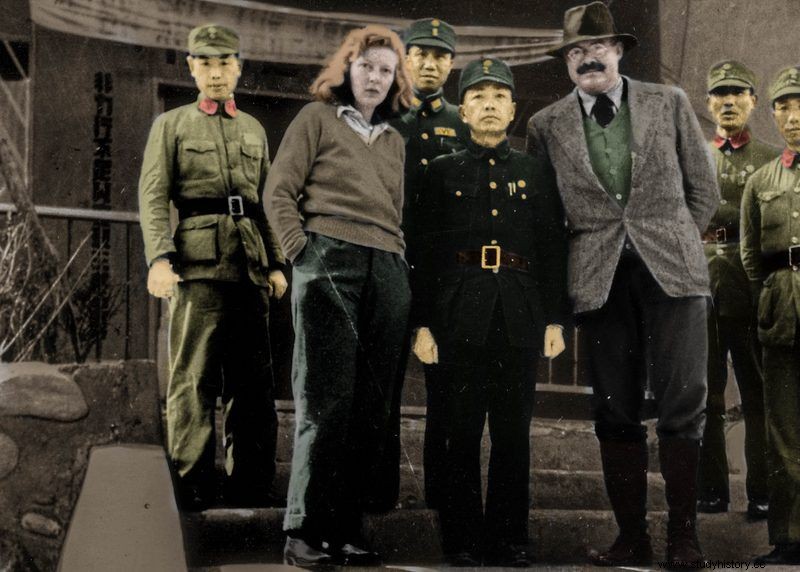
Martha Gellhorn, Ernest Hemingway and Chinese soldiers in 1941 (source:public domain).
Meanwhile, her relationship with Hemingway was in crisis. It wasn't as pleasant between the spouses as it was during their stay at the Ritz Hotel in Paris six years earlier. There was no end to the quarrels and malice, and Ernest was still trying to make her a housewife. Meanwhile, he was going to Great Britain, where the Allied forces were already getting ready.
He very much did not want his wife with him. If Martha hadn't gone, his competition would have quit in one fell swoop and… he might have had a little fun. A tempting prospect!
The plan was simple - first Ernest took his wife's job in the famous weekly "Collier's" . Thanks to this, he received the press accreditation to go to Europe, and not Martha. After that, he did not help his wife arrange a seat on the plane that took journalists to London. He explained hypocritically that they were not taking women on board. But he knew perfectly well that there would be other correspondents there as well.

Ernest flew away, and Marta was boiling. She wanted so much to be there where the fate of the war would change. Meanwhile, the husband tried to teach her where she belonged. What about at home? Never wait! She knew she had to deal with herself. Only how?
Explosive Ride
Desperate, Martha made a risky decision. She boarded - as the only civilian - on a military warship bound for Liverpool. And as if that wasn't enough adrenaline, the ship was filled with… explosives.
Due to the transported load, any possible collision was deadly. Whenever the captain saw any object on the horizon, he blew his whistle until the possible threat was gone. As Martha commented in a burst of black humor, it meant: "For God's sake, don't swim at me monkey, or I'll explode!" (Quote from:Tilar J. Mazzeo, "Hotel Ritz. Life, Death and Betrayal in Paris").
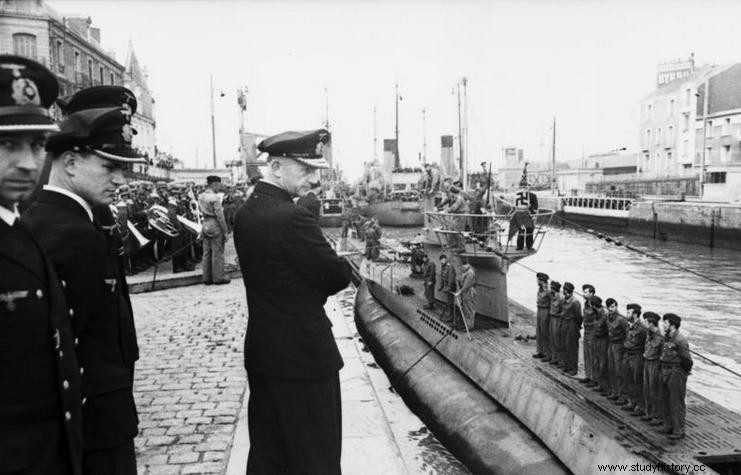
Martha feared that she would fall victim to Admiral Dönitz's submarines. In the photo he is standing with his arms folded (source:Bundesarchiv; lic. CC ASA 3.0).
However, it was not only the cargo of the ship and other vessels that constituted the threat. The U-boats were still on the way in the Atlantic which, in May 1944 alone, sank 4 allied ships. If a submarine had hit Martha's ship, the whole story would have ended in a big bang here.
Fortunately, the worst didn't happen. When Martha finally landed on British soil after 17 days of horror at sea, her initial rage at Ernest matured into a fury. She wanted to "thank" her husband for the cruise. But first it had to be tracked down.
When Martha is away, Ernest is playing
Wife found Ernest in… hospital. She was convinced he was simulating it to make her feel compassionate. This time, however, he was not lying. Well, at least not as much as usual…
A few days before Martha's arrival, a group of journalist friends had an epic party. Ernest's friend, Robert Capa, borrowed a 40-liter jug from ... an atomic research laboratory. In it he prepared a punch of peaches, brandy, a box of champagne and a tantalizing pinch of radioactive fumes.
Capa's group of unruly guests had fun all night with this awesome show. In the morning, flooded with shock, Hemingway with two other semiconscious companions got into the car to return to the hotel. Unaware of the slogan "I drink - I don't drive", the partygoers wanted to reach their own beds at all costs.
Meanwhile, the raids on London continued, so the city was unlit at night. There was also a ban on the use of car headlights. So it is hardly surprising that the inserted company in the Egyptian darkness smashed into the water tower.
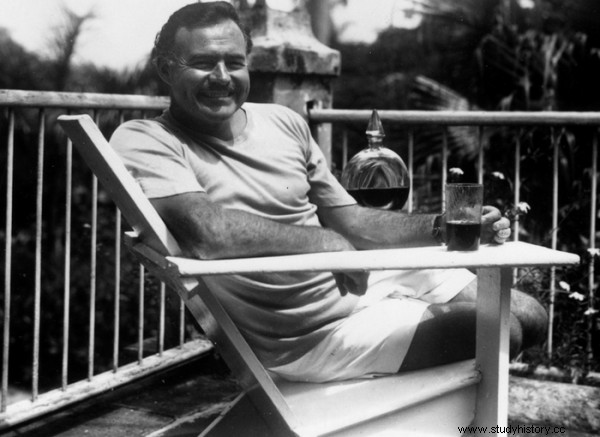
Even the scarred Hemingway had alcohol in his head (source:public domain).
Passengers with serious injuries were taken to hospital. Hemingway looked so scarred that his death even appeared in the press. Ernest, however, has yet to travel to the other world.
Concussion and the seams on the head did not sober the writer. When Martha returned, he was already indulging in drinking and love affairs in the hospital bed. She felt sick to her husband's bragging about the miraculous avoidance of death. As if she herself had survived little! She made a row with him, and when he was released, she refused to stay in the same hotel room with him.
Stinky road to Normandy…
Martha made it to London but was still away from the front and without accreditation. The longtime war correspondent had to move her head again to get to the center of events.
As Tilar J. Mazzeo explains in his book Hotel Ritz. Life, death and betrayal in Paris ”, the night before the invasion of Normandy, Martha persuaded one of the sailors to let her aboard a hospital ship. She lied that she only wanted to interview the paramedics. Meanwhile, instead of going to the cabins, she headed for the… toilet. The clever correspondent locked herself in it, waited for the ship to start sailing, and then joined the nurses.
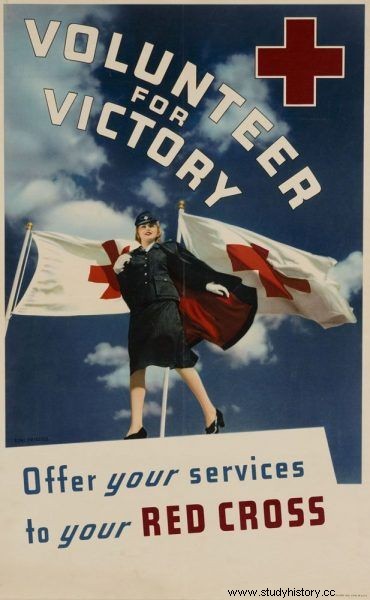
Martha did not need such an encouragement to consider it her duty to help Red Cross nurses (source:public domain).
When she reached the front, she worked with the girls and medics to save the injured Allied soldiers. Therefore, she sent her articles to Collier's magazine late. Besides, she might as well not send them at all. Due to the cooperation between the weekly and Hemingway, they were not printed.
As if that were not enough, Martha was interned for writing without accreditation and illegally coming to France near London. This brave woman, however, was unable to hold back even the bars and quickly broke free from captivity.
Finally, she obtained accreditation and made reports about the places of extermination of Jews, shaking the conscience of the West. She was, inter alia, witness to the liberation of Dachau. A few months after the Normandy landing, she divorced Ernest.
I'll get my revenge yet!
What happened to Martha's husband on D-Day? Hemingway was still bandaged at the time and was limping. For this reason, he could not board the RAF plane, as previously planned. Instead, he came on a landing barge. However, he was only with the seventh wave of troops, and he reached the beach when the first, groundbreaking fights had already ended. He watched the events from the deck and wrote a suggestive report. But he didn't feel fulfilled.
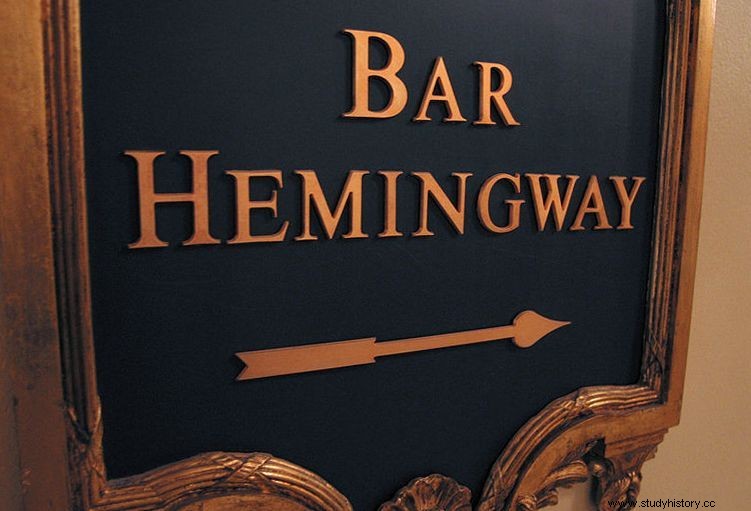
No wonder the bar at the Ritz Hotel is now named after Hemingway (photo:Pablo Sanchez, CC ASA 2.0 license).
He failed to stand on French soil. Even his wife overtook him, though he tried so hard not to let it happen. Robert Capa, the host of a party that had mixed up his plans so much, took pictures that went around the world on the battlefield. And Ernest didn't even get into the firing line…
Then he made his decision. He decided to liberate ... the luxurious Parisian Hotel Ritz! In fact, in August he became the first American (though not the first ally) to reach this legendary place. And since he could no longer free him from the Germans who had been wrong before, he eagerly took up the liberation of the cellars. From the wine stocks…
Follow-up:
- Antony Beevor, Artemis Cooper, Paris Liberated, Horizon 2015 sign.
- Martha Gellhorm Biography, [in:] Encyclopedia of World Biography.
- Paul Johnson, Intellectuals, Zysk i S-ka 2014.
